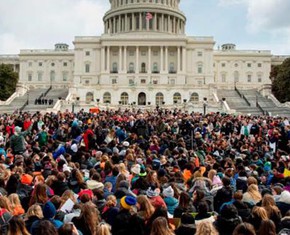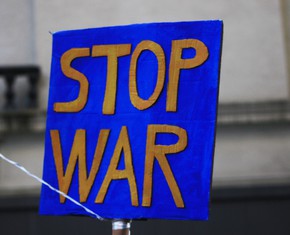The views expressed in our content reflect individual perspectives and do not represent the authoritative views of the Baha'i Faith.
The clothes we wear inherently say something about our beliefs—some more loudly than others.
From t-shirts with catchy slogans about the feminine trajectory of our future, to controversial ad campaigns featuring athletes who speak out against police brutality—apparel companies are up to something.
Beyond the messages, though, the rate at which and the way that fibers are harvested, fabric is manufactured, clothes are marketed, and worker labor is compensated all impact how we can gauge the value of a piece of clothing. They let us in on the social and environmental impact of the piece, and the ethics of the brand that manufactures and sells it.
Clothing companies also appeal to our ethos through the people used to brand their marketing campaigns and the messages printed on their products. All of these factors combined make it difficult to discern which clothes are actually completely ethically produced from start to finish. Obviously, our current framework needs reevaluating, which the Baha’i teachings call for:
The human world will adapt itself to a new social form, the justice of God will become manifest throughout human affairs, and human equality will be universally established. The poor will receive a great bestowal, and the rich attain eternal happiness. For although at the present time the rich enjoy the greatest luxury and comfort, they are nevertheless deprived of eternal happiness; for eternal happiness is contingent upon giving, and the poor are everywhere in the state of abject need.
Through the manifestation of God’s great equity the poor of the world will be rewarded and assisted fully, and there will be a readjustment in the economic conditions of mankind so that in the future there will not be the abnormally rich nor the abject poor. The rich will enjoy the privilege of this new economic condition as well as the poor, for owing to certain provisions and restrictions they will not be able to accumulate so much as to be burdened by its management, while the poor will be relieved from the stress of want and misery. The rich will enjoy his palace, and the poor will have his comfortable cottage. – Abdu’l-Baha, The Promulgation of Universal Peace, p. 131.
This new, justice-centered social form Abdu’l-Baha describes would allow for everyone to take part in the comfort of knowing that our clothes, and all the other products we need, haven’t been made at the expense of someone else’s human rights or the planet’s well-being. The conversation about ethical clothing manufacturing has recently been brought into the spotlight with Nike’s Colin Kaepernick campaign. Some critics of the campaign have expressed skepticism about Nike’s actual commitment to social justice for many reasons, in part because of the conditions in which their clothes are produced as well as the inhumane wages the people who actually make the clothes are paid.
Abdu’l-Baha talked about the Baha’i teachings regarding social justice and economics in his speeches in North America, recorded in The Promulgation of Universal Peace. He explained, in order to create economic systems that honor the humanity of everyone involved, the oneness of humanity is an essential first step:
The fundamentals of the whole economic condition are divine in nature and are associated with the world of the heart and spirit. This is fully explained in the Baha’i teaching … Hearts must be so cemented together, love must become so dominant that the rich shall most willingly extend assistance to the poor and take steps to establish these economic adjustments permanently. If it is accomplished in this way, it will be most praiseworthy because then it will be for the sake of God and in the pathway of His service. …
Strive, therefore, to create love in the hearts in order that they may become glowing and radiant. When that love is shining, it will permeate other hearts even as this electric light illumines its surroundings. When the love of God is established, everything else will be realized. This is the true foundation of all economics. – Ibid., p. 238.
In a world where hearts are cemented together in the way that Abdu’l- Baha describes, social action and economics will have a much different relationship than they do now. In a 1983 letter on social and economic development written to the Baha’is of the world, the Universal House of Justice described the need for a symbiotic relationship between our spirituality and day-to-day life:
The oneness of mankind, which is at once the operating principle and ultimate goal of [Baha’u’llah’s] Revelation, implies the achievement of a dynamic coherence between the spiritual and practical requirements of life on earth. …
This challenge evokes the resourcefulness, flexibility and cohesiveness of the many communities composing the Baha’i world. Different communities will, of course, perceive different approaches and different solutions to similar needs. Some can offer assistance abroad, while, at the outset, others must of necessity receive assistance; but all, irrespective of circumstances or resources, are endowed with the capacity to respond in some measure; all can share; all can participate in the joint enterprise of applying more systematically the principles of the Faith to uprising the quality of human life. The key to success is unity in spirit and in action.
Today, in the midst of all the controversy and sock-burning, it feels like purchasing the fruits of someone else’s labor attests to my personal investment in social justice more than my own labor. Something feels wrong with the underlying assertion that in order to participate in social justice, something that we are all encouraged to do, you have to buy into it—or buy it and burn it.
We can’t forget that while injustice has economic solutions and that there is power in the way we spend our money, social action is so multifaceted, its power is diluted when only viewed through the lenses of materialism and capitalism. Instead, we need to evaluate both the constructive and destructive elements of our existing economic structures and manufacturing strategies in order to build better systems in the future.
As someone who works in the apparel and fashion industry, I spend a lot of time thinking about the clothes that I wear and what they say about my values. I often find myself drawn to smaller brands that have distinct personalities and transparent business models. Nine times out of ten, I can’t afford to buy their clothes unless I save up over time. As I get older, I’ve stopped buying so many clothes, and started being a lot more selective about the things I purchase.
My newly minimalist approach, combined with an eagerness to really get to know the story behind the garments, still leaves room for action. Sometimes, when I notice that a company I like produces clothes in an unethical or problematic way, I’ll send them an email about it. I try never to condescend or come from a place of anger—I simply send a note from a potential customer regarding my hesitation to support a company whose values don’t align with mine. One thing I’ve taken away from my experience in fashion is that we, the consumers, have much more powerful voices than we think. If we let companies know what we really want, the good ones will adapt. As the Universal House of Justice said in their letter, we all have the capacity to respond to social and economic injustices—we just have to use it.
















Comments
Sign in or create an account
Continue with Googleor